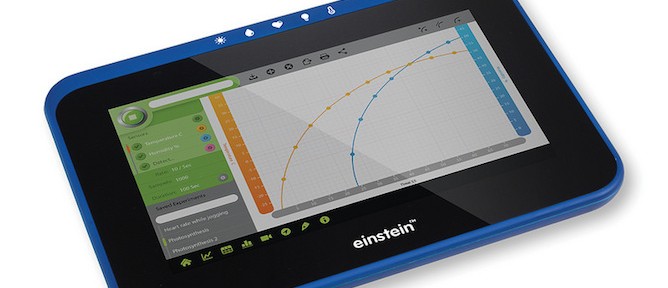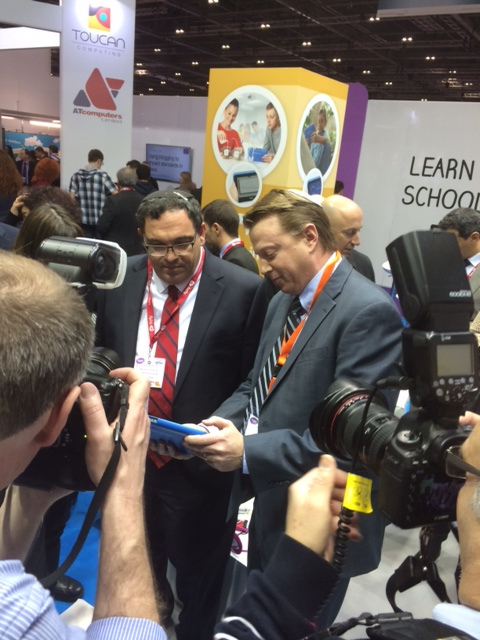
The Einstein Tablet+
The world’s only educational tablet dedicated to science education comes from an Israeli education technology company you probably never heard of.
Though Rosh HaAyin-based Fourier Education has been selling products for 25 years, has customers in 50 countries and partners with the likes of HP, Acer and Intel, the company has grabbed the limelight with its Einstein Tablet+ and related products introduced in September 2013.
The unique Einstein science learning platform, for science students from elementary to high-school grades, unifies sensor-based experiments, interactive multimedia activities and user-friendly analysis applications on the dedicated device — or on any tablet or computer.
In other words, as the company puts it: “Scientific discovery is only a finger swipe away.”
The Oscar of ed-tech
Einstein Tablet+ sold out of its first manufacturing run even before it came off the production line, and in January it won the 2014 Bett Award for digital devices – the education technology industry’s equivalent of an Academy Award.
Fourier CEO Ken Zweibel says the award was “great recognition for the two years of teamwork behind the launch of this product. It is already sold in 30 countries now, and I suspect we will get to 75 or 80,” he tells ISRAEL21c. “We have interest even from countries we have not heard of before.”
Fourier is a member of the European Union’s Schoolnet, which aims to promote technology education among its members and related countries. It is the third-leading educational science products company in terms of US sales.
Zweibel explains that the tablet is meant to fill a major gap in science education for younger children everywhere.

Fourier CEO Ken Zweibel demonstrating the Einstein Tablet+ to Israel Education Minister Shai Piron
“One goal for the Einstein Tablet+ is to answer the needs of third-graders as well as advanced 12th-graders. Everyone knows how to use a tablet, so we just built on the existing knowledge base of the world and put it on a tablet,” he says.
“We are, of course, a for-profit company,” Zweibel adds. “But at the end of the day, we do something tremendous: revolutionizing science education. Values like that you don’t find every day in the high-tech world.”
A slew of functions
More than a dozen companies make data loggers — computerized science laboratories for classrooms. Fourier wanted to offer something more sophisticated and at the same time more kid-friendly: a full-featured tablet with data logging abilities built inside it.
The device gathers input through a microphone, accelerometer, GPS and embedded sensors that measure humidity, heart rate, temperature, light and ultraviolet waves. Up to eight additional external sensors, from a choice of 60, can be plugged in at once. There is also a cheaper three-sensor model.
The Einstein Tablet+ retails for $349 but is offered to schools for $299. The full product line also includes the free downloadable MultiLab real-time data analysis program for any PC; the MiLAB app for mobile devices; an integrated STEM (science, technology, engineering and math) curriculum called “It’s About Time”; and the LabMate device that can turn any tablet or computer into a science lab.
The tablet’s preinstalled software — including MiLAB and einsteinWorld — provides “a slew of functions and things you can do with the data from the experiment you just ran to understand it better,” says Zweibel.
His third-grade daughter was able to carry out basic research experiments on the prototype Einstein Tablet+ without adult intervention and without reading the instruction manual, says Zweibel.
“My goal is that it will be so easy to use you can just turn it on. For advanced features and functions, of course, you’ll have a learning curve,” he says.
Fun for STEM teachers
Perhaps just as importantly, the device was designed for ease of use by teachers. Many science teachers are not specifically trained in the topics they must teach, Zweibel points out, and the tablet can act as a fun, high-tech teacher’s aide.
“And after we introduced it in the United States at the Florida Education Technology Conference at the end of January, we got tremendous feedback,” he says.
Fourier is planning a “STEMathon” at the April 2014 conference of the National Science Teachers Association in Boston. Teachers at the event will be invited to innovate classroom activities on the Einstein platform, with prizes for the most creative ideas.
“We’ll turn science teachers into hackers,” Zweibel predicts.
The name “Einstein” was chosen because it globally symbolizes the scientific innovation of Nobel laureate Albert Einstein, father of the theory of relativity. Einstein also has a strong Israeli connection, as he was among the founders of the Hebrew University of Jerusalem (HUJ) and willed his personal archives and the rights to his works to the university. Fourier received permission from HUJ to use the name.
For more information on the Einstein Tablet+, see fourieredu.com.
